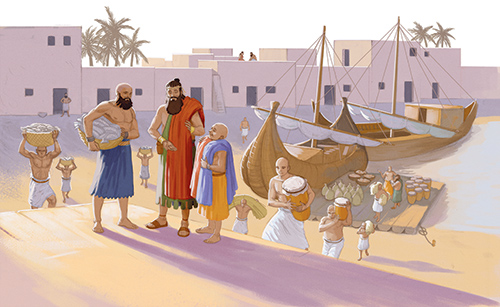BJU Press’s elementary heritage studies product line guides students in analyzing and evaluating historical events, world cultures, and primary sources from a biblical worldview. Engaging lessons and activities develop and strengthen 21st century skills through a variety of features, including graphic organizers, reinforcement pages, biographies, map skills, and study guides. Students relate social studies to other academic disciplines through cross-curricular links, background information, and interactive visuals in ways that help them learn how to make wise decisions about their world.
Program Approach of Elementary Social Studies
Our social studies program helps students to understand and interact in God’s world. To do that, it shows them how they fit into God’s design. God created humans as individual and social beings. When people live and work together to develop culture in God-glorifying ways, honoring the institutions God has established, they fulfill His creational purpose for them. Students who have social studies skills and who can evaluate their world from a biblical worldview are equipped to be lifelong learners who can propose solutions to the problems our society faces.
Developing Social Studies Skills
We have designed the elementary heritage studies program to introduce and develop in students key social studies skills as well as foundations in geography, economics, history, government, civics, and culture. Activities and skills sections in the student edition prepare students for learning these skills while lessons balance between each of the social studies areas.
The teacher editions include suggested discussion topics and activities that give students opportunities to practice collaboration and creativity. The student editions include numerous exercises that require students to observe and interact with information—they will need to organize information into chronological order and discern connections between events. Additionally, students will learn map-reading skills by interacting with charts, graphs, map illustrations, and diagrams. Teacher-directed discussions help students to make connections between the graphics and text.
Most importantly, every lesson in every grade focuses on developing students’ ability to read for understanding. Literacy skills and familiarity with reading informational texts are vital for studies in all disciplines, so our teacher and student editions focus on reading comprehension skills and include comprehension strategies.
Evaluating Problems from a Biblical Worldview
Our elementary social studies program develops students’ critical-thinking skills by encouraging them to evaluate sources, cultures, and events from a biblical worldview. Students need to develop a knowledge of the United States’ past and understand the values that have shaped the nation’s story in order to make wise decisions about the values they will hold in the future. The student editions will help them understand the institutions that God has created that make up our culture. God has designed marriage, family, government, industry, economics, and the church to serve specific purposes. He has also designed the earth itself to serve specific purposes. Not only will our program help students understand those institutions, our planet, and our history, it will also help them to recognize and critique secular representations. By studying culture and society from a biblical worldview, students learn to evaluate the effects of the Fall on their culture. They also learn to live in their world as God intended.
Activities will highlight founding documents, giving students an opportunity to evaluate the principles that the United States was founded on. These resources help the teacher to dig deeper than the dates and facts of history and social studies. History chapters in the student editions help students to understand that history isn’t just a random and meaningless series of events. As they evaluate historical events according to biblical standards, they will be able to clearly see how the Fall still impacts the course of human history.
Proposing Solutions from a Biblical Worldview
This program introduces students to realworld social studies issues that they will encounter throughout their lives. As they develop a strong biblical worldview foundation of the social studies, they will be able to propose God-honoring solutions to those issues. In the student editions, students will be encouraged to relate humanity’s use of the environment to the Creation Mandate, and to propose ways to use the earth for the benefit of people wisely and appropriately. In economics, government, civics, and culture, they will be introduced to the biblical basis for hard work, the role of governments, our role as citizens, and the development of culture. These bases will help them come to effective solutions to social issues.
Becoming Lifelong Learners
Through captivating text, illustrations, activities, and extras, we strive to cultivate a lifelong interest in history, geography, citizenship, government, economics, and culture. Students who are informed and aware about not only their current society, but also the history of their society are better able to recognize the struggles it has gone through to gain freedom and equality. They will also know the importance of individual responsibility in gaining these things.
Vision
To equip students to understand, biblically evaluate, engage in, and make decisions about their world
Goals
- To develop social studies skills and a foundational understanding of geography, economics, history, government, civics, and culture
- To evaluate sources, cultures, and events from a biblical worldview
- To propose solutions to economic, political, and social problems
- To become lifelong learners who value freedom, equality, and individual responsibility
Materials
Student Text
Using well-researched content combined with colorful photos, illustrations, and graphics, each student edition integrates Bible, citizenship, culture, economics, geography, government, and history to give students the foundation in social studies.
Teacher Edition
The teacher edition for each grade contains full-color, reduced-size student pages plus extras, such as discussion ideas, background information, hands-on activities, review games, and songs as mnemonic devices that make learning memorable. Some lessons provide opportunities for collaboration and teamwork, creativity and imagination, critical thinking, and technology literacy.
Activities
This companion to the student edition provides a variety of pages that reinforce the students’ understanding of key concepts and reviews what has been learned. Activities include map skills, study skills, timelines, graphic organizers, charts, writing in the content area, and biblical integration. An answer key is available as a separate book.
Assessments
Each assessment packet contains one test per chapter or unit, covering the most important concepts taught in the lessons. These tests can be adjusted in accordance with teaching emphasis and direction. Tests will include using graphic organizers, models, maps, and primary sources. Students will also be expected to identify documents, symbols, events, and people. The tests should be used in conjunction with your individual assessment of a student’s understanding and application. The assessments answer key is available for separate purchase.
Scope & Sequence

Heritage Studies 1
Focus
Developing a Christian worldview of the family, community, jobs, land, and the United States
Geography
Types of land and water, continents and oceans; Globes and maps (title, key, compass rose), cardinal directions; Saving and using resources
Weather
Seasons; Water cycle
History
Time (past, present, future); Primary and secondary sources
American History
Native Americans; Explorers; Settlements: Jamestown and Plymouth; Founding of the United States; Abraham Lincoln; Effects of immigration; United States today
Government
Rules and laws, justice; Community, state, and national leaders; elections; Description and symbols of the United States; Rights and responsibilities of American citizens
Economics
Needs and wants; Goods and services; Trading, barter, money; Jobs, volunteers; Budgeting; Technology and tools
Culture
Biblical worldview; Families and homes; Celebrations; Families in history; Churches and schools; Changes in travel and communication; Contributions of immigrants
Social Studies Skills
Addresses and landmarks; Sorting and sequencing; Bar graphs, diagrams, timelines, and calendars; Literacy skills: compare, main idea and details, fact and opinion, cause and effect

Heritage Studies 2
Focus
Developing a Christian worldview of communities, government, buying and selling, people and places, and American culture
Geography
Map skills: grid map, map scale; Geography of North America; Geography of United States: population density, land forms, bodies of water, climate zones
History
Communities: development of changes within; Memorials
Government
How a bill becomes a law; Purpose of government; Constitution, Bill of Rights; Levels of government (national, state, local); Choosing leaders; Citizens: process of citizenship, rights and responsibilities; Countries working together
Social Studies Skills
Comparing points of view; Problem solving; Comparing fact and fiction; Cause and effect; Primary and secondary sources
Economics
Work, specialization; Scarcity, opportunity cost, budgets; Goods and services; Producers and consumers, types of resources; Supply and demand; Trading between countries
American Culture
Core values; Influences: Native Americans, immigrants, technology; Sharing culture

Heritage Studies 3
Focus
Developing a biblical worldview of geography.
Geography
Maps; Earth’s physical features; Cultural and economic impacts of human interaction with the environment; Interconnections between world regions; Geographical knowledge-based evaluations and assessments
Government
Capitals; Government types; Leaders
Economics
Industries; Trade; Currencies
History
Exploration and migration; Conflicts; Origins of cultures
Culture
Religions and beliefs; Indigenous customs; Traditional arts; Ethnic food and clothing
Religion
Traditional beliefs; Christianity
Literacy Skills
Classify; Summarize
Social Studies Skill
Map projections

Heritage Studies 4
Focus
Developing a biblical worldview of the study of state and territorial history
Geography
Maps: political, regional, physical, environmental, and territorial; Geographical features: landforms, bodies of water; State capitals and major cities; Relationship between geography and early settlements; Impact of rapid industrial development on the environment; Natural disasters
World History
European exploration; World Wars I and II; Persian Gulf War; COVID-19 pandemic
American History
Native Americans; Explorers, traders, and missionaries; American land expansion; American wars: Revolutionary War, War of 1812, Civil War, etc.; Abolition and civil rights; Inventions: medicine, space technology, transportation; Pearl Harbor and 9/11 attacks
Government
Federal documents: US Constitution, Bill of Rights, Articles of Confederation; Branches of American government; Federal and state government; Citizen’s rights and responsibilities
Economics
Stock market; Industries and resources
Culture
Impact of Native American culture: food, art, vocabulary; Impact of immigrants: business, food, religion, speech; Religions in America; State attractions: parks, landmarks, sports, festivals, music, customs; Literature
Social Studies Skills
Internet safety; Route maps; Predicting consequences; Discerning bias

Heritage Studies 5
Time Period
AD 1400 to the present
Map Skills
Cardinal and intermediate directions, map symbols and key, map scales, map grids, latitude and longitude, time zones
Kinds of Maps
Globe, historical, physical and relief, road map, distribution map, political, map projection, regions/state capitals
American History
Chronological presention; Events and personalities from pre-Columbus to the present; Biblical evaluations of events, actions, and attitudes
Government
Biblical philosophy; Roles of the three branches of government
Economics
Inventions; Stock market; Supply and demand
Culture
Languages; Religions; Customs


